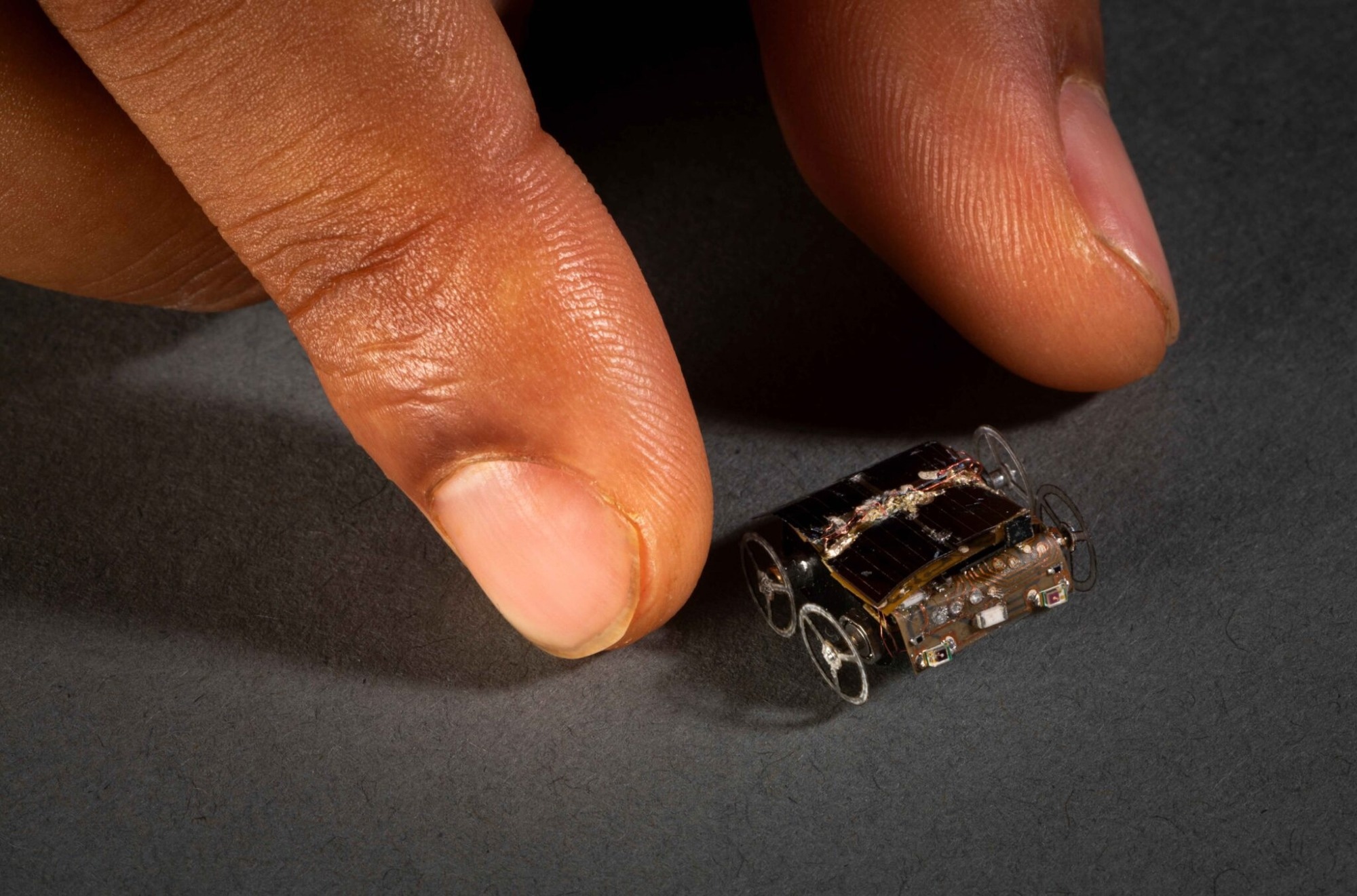
Researchers at the University of Washington have now created MilliMobile, a tiny, self-driving robot powered only by surrounding light or radio waves. It is about the size of a penny and can run indefinitely on harvested energy. Image Credit: Mark Stone/University of Washington
However, the mobility of robots requires a substantial amount of energy, and traditional power sources like batteries come with limitations that impact their lifespan and raise environmental concerns.
To address these challenges, researchers have explored various alternatives, such as attaching sensors to insects, using nearby charging mats, or relying on laser-based power sources. However, each of these approaches has its own set of drawbacks. Insects have unpredictable movements, charging mats limit the range of robots, and lasers can pose risks to human eyes.
In response to these challenges, scientists at the University of Washington have developed MilliMobile, a minuscule autonomous robot that relies solely on ambient light and radio waves for power.
This innovative robot features an energy-harvesting system similar to a solar panel and is equipped with four wheels. Despite its tiny size, MilliMobile is approximately the size of a penny and weighs as much as a raisin, yet it can cover impressive distances, moving the length of a bus (30 feet or 10 meters) in an hour, even on overcast days.
The robot is capable of traversing various surfaces, including concrete and compacted soil, and has the capacity to transport equipment nearly three times its own weight, such as cameras or sensors. It relies on a light sensor for autonomous navigation towards light sources, enabling it to operate continuously by harnessing harvested power.
The research findings will be unveiled by the team on October 2nd, 2023, at the ACM MobiCom 2023 conference in Madrid, Spain.
We took inspiration from ‘intermittent computing,’ which breaks complex programs into small steps, so a device with very limited power can work incrementally, as energy is available.
Kyle Johnson, Study Co-Lead Author and Doctoral Student, Paul G. Allen School of Computer Science & Engineering, University of Washington
Johnson added, “With MilliMobile, we applied this concept to motion. We reduced the robot’s size and weight so it takes only a small amount of energy to move. And, similar to an animal taking steps, our robot moves in discrete increments, using small pulses of energy to turn its wheels.”
The MilliMobile was subjected to testing in various environments, both indoor and outdoor, including settings such as parks, an indoor hydroponic farm, and an office. Even when exposed to extremely low light conditions, such as being powered solely by the illumination beneath a kitchen counter, these robots are still capable of moving, albeit at a significantly slower pace.
This continuous movement, even at a reduced speed, opens up new possibilities for a swarm of robots deployed in areas where conventional sensors struggle to collect detailed data.
Additionally, these robots possess the ability to autonomously navigate using their onboard sensors and miniature computing chips. To illustrate this capability, the team programmed the robots to utilize their onboard light sensors for guidance toward a light source.
Internet of Things’ sensors are usually fixed in specific locations. Our work crosses domains to create robotic sensors that can sample data at multiple points throughout a space to create a more detailed view of its environment, whether that’s a smart farm where the robots are tracking humidity and soil moisture, or a factory where they’re seeking out electromagnetic noise to find equipment malfunctions.
Zachary Englhardt, Study Co-Lead Author and Doctoral Student, Allen School, University of Washington
Scientists have equipped the MilliMobile with a range of sensors, including those for light, temperature, and humidity.
Furthermore, it boasts Bluetooth capabilities that empower it to transmit data across distances of up to 650 feet (200 meters). In their future plans, they aim to augment the robot's functionality by incorporating additional sensors and improving the ability to share data among groups of these robots.
The research paper has multiple contributors, including Vicente Arroyos, a doctoral student at the University of Washington's Allen School, who served as one of the co-lead authors.
Dennis Yin, who conducted this research during his undergraduate studies in electrical and computer engineering at UW, and Shwetak Patel, a Professor at UW in the Allen School and in electrical and computer engineering, are listed as co-authors. Vikram Iyer, an Assistant Professor at UW in the Allen School, is the senior author of the study.
This study was financially supported by an Amazon Research Award, a Google Research Scholar award, the National Science Foundation Graduate Research Fellowship Program, the National GEM Consortium, the Washington NASA Space Grant Consortium, the Pastry-Powered T(o)uring Machine Endowed Fellowship, and the SPEEA ACE fellowship program.
MilliMobile: An Autonomous Battery-free Wireless Microrobot
Video Credit: University of Washington
Journal Reference